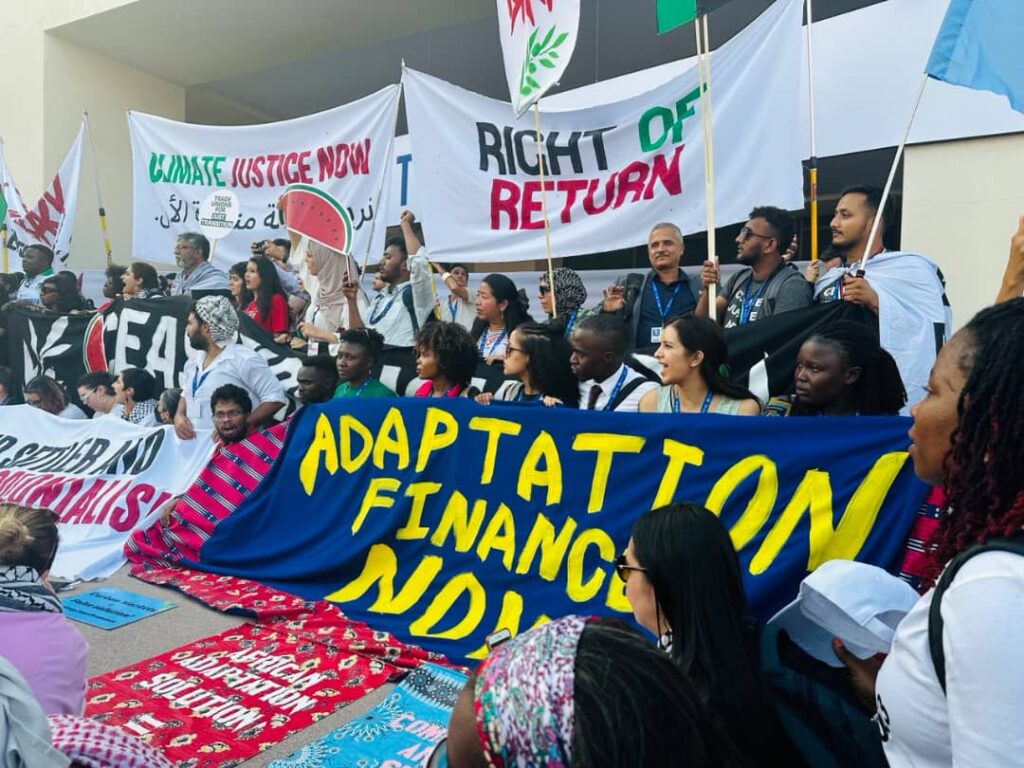Climate change is an undeniable crisis which continues to inflict devastating consequences on vulnerable nations, leading to irreversible economic and non-economic losses. The recently concluded COP28 striked the first Global Stocktake, while putting inclusion of all stakeholders firmly at the core. It forged a new sense of optimism and hope, bringing about unprecedented consensus through negotiations on the main pillars of the Paris Agreement. New ambitions were raised on adaptation, mitigation and effectual ways of implementation. The summit was truly a gathering of diverse minds and voices, with an aim to achieve what once seemed impossible, setting the world on a clear path of putting 1.5°C within reach.

Agape Earth Coalition(AEC) was mainly centered on adaptation strategies and goals for the people in the Global South and what was the international stand of world negotiators on these topics. Focusing on solutions which are favorable to the local people, nature, lives and livelihoods, and pushing for inclusivity of civil society from the Global south, so as to pave paths that create a difference. AEC sponsored several youth representatives from more than 5 African countries including: Kenya, Uganda, Botswana, DRC, Nigeria, Ivory Coast etc. Where our target was to ensure we had a big engagement with several leaders and policy makers from both Africa and the Global North. Emphasizing to them the grave need of adaptation in climate vulnerable communities and showcasing possible execution methods.
The blue zone had glaring collaborative opportunities from meetings with heads of state, negotiators,parliamentarians, philanthropies, indigenous people.Where our members were speakers on panels almost on a daily basis, challenged negotiators and participated in multiple listening sessions. Most importantly we were involved in climate actions enabling the narrative of adaptation finance for Africa to be given more attention. Significantly, on 9th of December we unified as youth from the African continent to echo and elaborate on African tailored climate solutions. We matched with boldness and even if what we were fighting for seemed unpopular, our encouragement came in on seeing several other climate activists from all over the world joining us. Such first steps are always sketchy but mark the beginning of a trajectory which could change history.
Another remarkable day at the summit was 13th December 2023 which was highlighted by the 1st Global stocktake, setting out the ambitious actions needed to keep 1.5C within reach. These actions are listed below:
- Unprecedented reference to transitioning away from all fossil fuels in energy systems, in a just and orderly and equitable manner in these critical decades to enable the world to reach net zero by 2050.
- Accelerate ambitious, economy-wide emission reduction targets, in their next nationally determined contributions.
- Offer a new, specific target on tripling renewables and doubling energy efficiency by 2030
Recognizes the need to significantly scale up adaptation finance beyond doubling, to meet urgent and evolving needs. - Build momentum toward reform of the global financial architecture, calling for scaling up of concessional and grant finance.
It’s now up to different parties or states to deliver the highest ambition of the GST, by beginning at national level then moving on to international levels. Regrettably, many times our own governments are not fast to act when it comes to phasing out fossil fuels completely or transitioning to renewable energy. For that reason we should be aware that in this fight there is still a huge disparity between the priorities of our governments and those of civil society. Therefore, climate defenders still have diverse and sizable roles to play before physical unfolding of climate actions in grass route communities is witnessed.
At The COP28 conference, the Adaptation fund mobilized over $192 million and this was considered good progress, but the numbers are still short when compared to funds resource mobilization goal of $300 million. Additionally, Africa’s Nationally Determined Contributions (NDCs) currently estimate the continent’s requirements at $52.7 billion a year for adaptation. However, this is considered to be a vast underestimate as only half of the NDCs, from 28 countries out of 54, were used to calculate costs for adaptation. Moreover, the NDCs were also prepared at a time when climate impacts were not projected to occur as quickly or as strongly as they are in current times. Sadly, loans have also been the most utilized instrument to deliver adaptation finance. These are combined with surging interest rates, and therefore, are contributing to Africa’s poorest countries falling into more debt traps. We will continue to remind our African leaders to not only advocate for more adaptation finance but also equally ensure that this money comes only in the form of grants and not loans.
Finally, all rich countries were urged to quickly scale up adaptation finance if they are to protect the lives of people in the most vulnerable communities. “Even if we stopped all emissions today, accelerated adaptation is still needed to respond to the devastating climate impacts already being experienced.” In line with the mandate to develop an impactful global goal for adaptation promised as part of the Paris agreement, COP28 has delivered the Emirates Framework For Global climate resilience. This will put adaptation focus and action on the same level with mitigation in order to scale up action on adaptation. It will put the two main factors into consideration as noted below:
- Targets universal sets of themes essential for sustainable development and human well being food, water, health, shelter, livelihoods, nature, biodiversity and culture.
- Targets on how to approach adaptation to national levels.The world’s largest private market climate investment was launched at $30 billion, bringing about ambitious decarbonisation targets.
We are taking note of all these written policies and hoping we will shift away from mere documentation of strategic plans to actual climate action implementation projects on ground that improve the lives of people at local levels and protect our environment.
